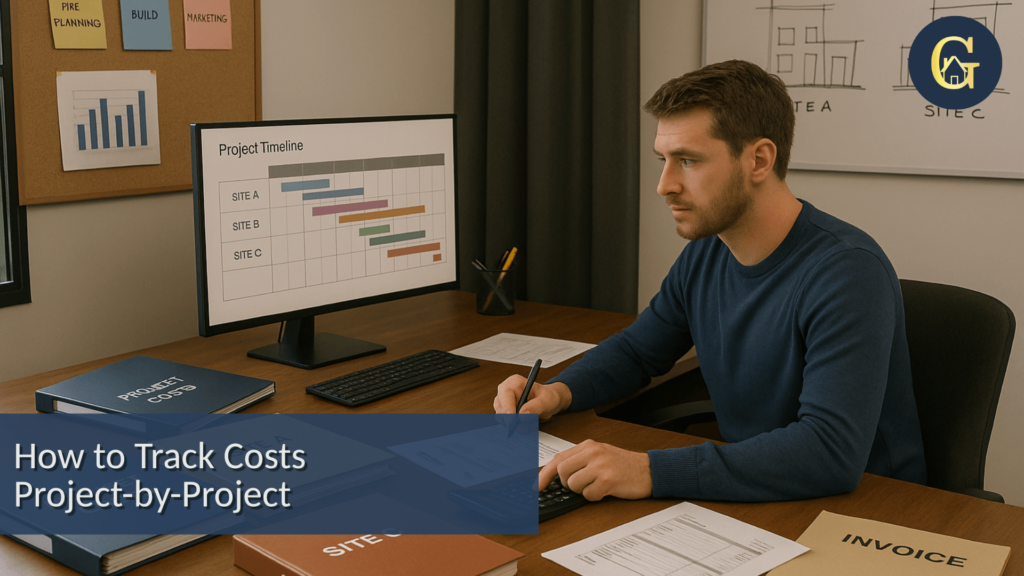If you’re a property developer juggling multiple sites, invoices, and build stages, you already know how easy it is to lose track of your numbers. You’re not just running a business – you’re managing a complex, high-stakes project with dozens of moving parts. And when the bookkeeping falls behind, the profit starts to slip through the cracks.
Why Developers Need Specialised Bookkeeping
Development isn’t like a standard business. You’re not selling products or billing for time – you’re managing phases, contractors, planning costs, and funding structures that vary from project to project. Without proper systems in place, it’s easy to:
- Miss claimable VAT
- Overpay contractors
- Struggle with cashflow forecasting
- Lose visibility over individual site performance
- Fall short of lender or investor expectations
- Trigger unnecessary taxes (like ATED) if you don’t claim the right reliefs for high-value residential properties over £500,000
Accurate, project-level bookkeeping gives you real-time data to manage costs, track profitability, and prepare for smooth exits.
Setting Up a Project-Based Chart of Accounts
One of the first steps to clean, developer-friendly bookkeeping is setting up a project-based chart of accounts. That means structuring your accounts so that every cost, invoice and payment is tracked against the correct site or SPV.
We recommend breaking it down further by:
- Development phase (e.g. pre-planning, groundworks, build, marketing)
- Cost category (materials, professional fees, finance, legal, etc.)
- Funding source or equity partner (where applicable)
This makes it easy to run reports on spend to date, forecast remaining costs and justify drawdowns with lenders.
Allocating Costs by Site, Stage, and Type
Whether you’re running one site or ten, you need to be allocating every pound to the correct project – not just coding everything to “materials” or “contractor fees.”
A good bookkeeping system should allow you to:
- Tag costs by project or SPV
- Separate capital expenses from operating costs
- Track staged payments and retentions
- Monitor funding injections from investors or directors
This detail helps you understand true profit margins, spot overspends early, and provide clean data to investors or buyers if you choose to sell.
Cost Allocation for Multi-Unit Sites
If you’re working on a multi-unit development, allocating build and labour costs to each individual unit is key, especially when it comes to accurate profit analysis and tax planning.
Proper allocation lets you:
- Determine unit-level profitability
- Justify valuations for refinancing or resale
- Support accurate VAT reclaims
- Prepare for partial sales and staged completions
- Strengthen your case for tax reliefs like capital allowances or ATED reliefs
Failing to break down costs per unit can make it difficult to produce compliant records and can leave profit trapped in your books instead of in your pocket.
Managing Invoices and Contractor Payments
Managing contractors means managing cash and good bookkeeping keeps you on the front foot. At GoldHouse, we help developers implement systems that:
- Track invoice approvals and due dates
- Set up automated reminders for staged payments
- Apply domestic reverse charge VAT correctly for subcontractors
- Keep CIS records clean and HMRC-ready
This reduces late payments, avoids disputes and keeps your reputation strong in a relationship-driven industry.
Using Software to Stay on Top of Financials
Modern bookkeeping is powered by software and when set up correctly, it gives you instant visibility on your project’s financial health.
We recommend using platforms like Xero which is integrated with project tracking tools and document storage. With a proper setup, you can:
- See cost vs budget in real time
- Upload and categorise invoices from your phone
- Share reports with investors or lenders in one click
- Stay VAT-compliant without last-minute panic
Software won’t solve everything, but with the right accountant by your side, it becomes a powerful tool to stay in control.
When to Involve a Specialist Accountant
Not all accountants understand development and generic bookkeeping won’t cut it when you’re dealing with layered funding, VAT complexities, and multi-stage costs. A property-savvy accountant can help you:
- Set up a project-specific chart of accounts
- Plan VAT reclaims and Corporation Tax strategy (e.g. identifying allowable costs to reduce tax bills and optimise timing of claims)
- Produce investor and lender ready reports
- Keep your books clean, accurate and audit-ready
- Navigate tax traps like ATED and ensure relevant reliefs are claimed to avoid unnecessary annual charges
At GoldHouse, we work with developers at every stage – from setting up your first SPV to managing multi-site portfolios and structuring tax-efficient exits.
Book a discovery call with GoldHouse today and take control of your development numbers. We’ll help you build a bookkeeping system that supports your profit, protects your time, and keeps you lender- and investor-ready, from start to sale and beyond.



